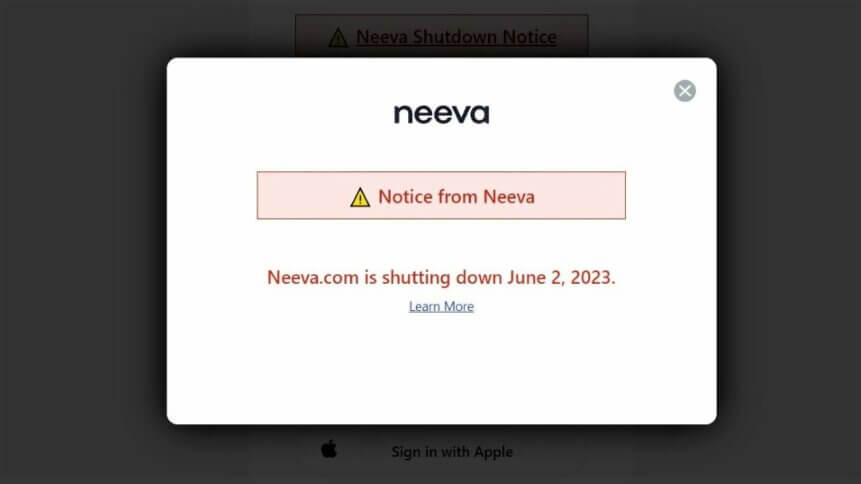AI in search – Neeva closes answer engine, switches to enterprise

What does it take to compete with Google on using AI in search? Based on the recent announcement by answer engine developer Neeva – which is closing its large language model (LLM) enabled search tool – the answer is more than 50 people and $70 million dollars.
Microsoft has invested many times that amount (at least $10 billion) in OpenAI in an attempt to chip away at Google’s internet search dominance. And the rewards for even a small piece of that pie could be significant. “For every one point of share gain in the search advertising market, it’s a $2 billion revenue opportunity for our advertising business,” Phil Ockenden – Chief Financial Officer of Windows, Devices, and Search businesses at Microsoft – revealed during an investor call in February 2023 discussing the firm’s new AI-powered Bing search and Edge browser.
Like Microsoft, Neeva wanted to encourage users to step away from Google’s incredibly popular search engine, which was never going to be easy. Google still has more than 86% of the desktop search engine market share worldwide, despite Microsoft’s determined efforts, as analysis by Search Engine Land highlights. And Chrome is the default browser on Apple’s iPhone and other iOS and macOS devices, which further cements Google’s dominant position.
But Neeva wasn’t looking to grab advertising revenue away from the California-headquartered search giant. The start-up’s income was subscription-based, and its business proposition was based on giving users an ad-free search experience that valued privacy. And backing this fresh approach to distributing indexed information were co-founders Sridhar Ramaswamy (ex-SVP of Ads at Google) and Vivek Raghunathan (ex-VP of Monetisation at YouTube).
Ramping up the use of AI in search
Neeva, which began operations in 2019, ramped up its use of AI in search at the beginning of 2023, firstly to customers in the US. And then – hot on the heels of Microsoft’s announcement that it would be introducing ChatGPT to Bing – Neeva rolled out its LLM search capabilities internationally to customers in Europe and North America.
The capabilities of LLMs, vast statistical models that can predict what words (or computer code) will come next based on user prompts, continue to astound. Recently, researchers showed that generative AI can read your mind when trained using non-invasive brain scans. But when it comes to AI in search, LLMs have some shortcomings despite their power, and Neeva wanted to address these.
“First, ChatGPT’s output does not include sources or references. It is impossible to determine the credibility of an answer by identifying and looking up the primary source(s),” wrote Neeva, introducing its NeevaAI upgrade. “Second, ChatGPT does not retrieve real-time data or information. The model stops at 2021, making it less useful for the needs of current searches.”
Neeva’s developers had found a way to infuse the power of LLMs to efficiently summarize huge amounts of information with sources so that users could establish where those details had come from and fact-check the information. When scrutinized by eagle-eyed researcher Dmitri Brereton, Microsoft’s private demo of its chatbot-enhanced Bing was subsequently found to contain multiple factual errors. And Google’s Bard was no better, also getting information wrong and knocking billions off the search giant’s market value.
Google Bard disclaimer
Even today, Bard carries a disclaimer pointing out that Google’s AI-powered search tool may display inaccurate information. And such issues highlight that Neeva’s ability to provide cited, real-time AI answers to queries should have been a game changer. In March 2023, OpenAI introduced ChatGPT plugins that allowed the advanced chatbot to access up-to-date information (as well as perform other tasks), which took some of the wind out of Neeva’s sails. But it appears that muscle memory could have been the start-ups undoing.
“We’ve discovered that it is one thing to build a search engine, and an entirely different thing to convince regular users of the need to switch to a better choice. From the unnecessary friction required to change default search settings, to the challenges in helping people understand the difference between a search engine and a browser, acquiring users has been really hard,” write Ramaswamy and Raghunathan in their announcement on the next steps for Neeva.
In the post, the co-founders hint that it could be enterprises that may ultimately benefit from the search and information retrieval talents of LLMs. And the biggest clue to Neeva’s future came a few days later when Snowflake announced that it had acquired Neeva to accelerate search in the Data Cloud through generative AI.
Snowflake has been successful in helping firms to de-silo and decentralize their data and profit from the insights that were previously going to waste. And the Neeva acquisition adds to that by giving companies an even sharper search tool to discover the right information at the right time.
AI in search is revolutionary, but it may turn out to be the case that the winners will be familiar faces rather than disruptors, at least when it comes to looking for information on the internet. However, addressing the fact-checking risk of using LLMs feels like an accomplishment that should have delivered more rewards for Neeva. But these are still early days for generative AI, and solutions are evolving fast.
And users looking for an LLM-powered search alternative to Google’s Bard or Microsoft’s ChatGPT-enhanced Bing products still have options to explore such as You.com, which features YouChat – a conversational search assistant.










